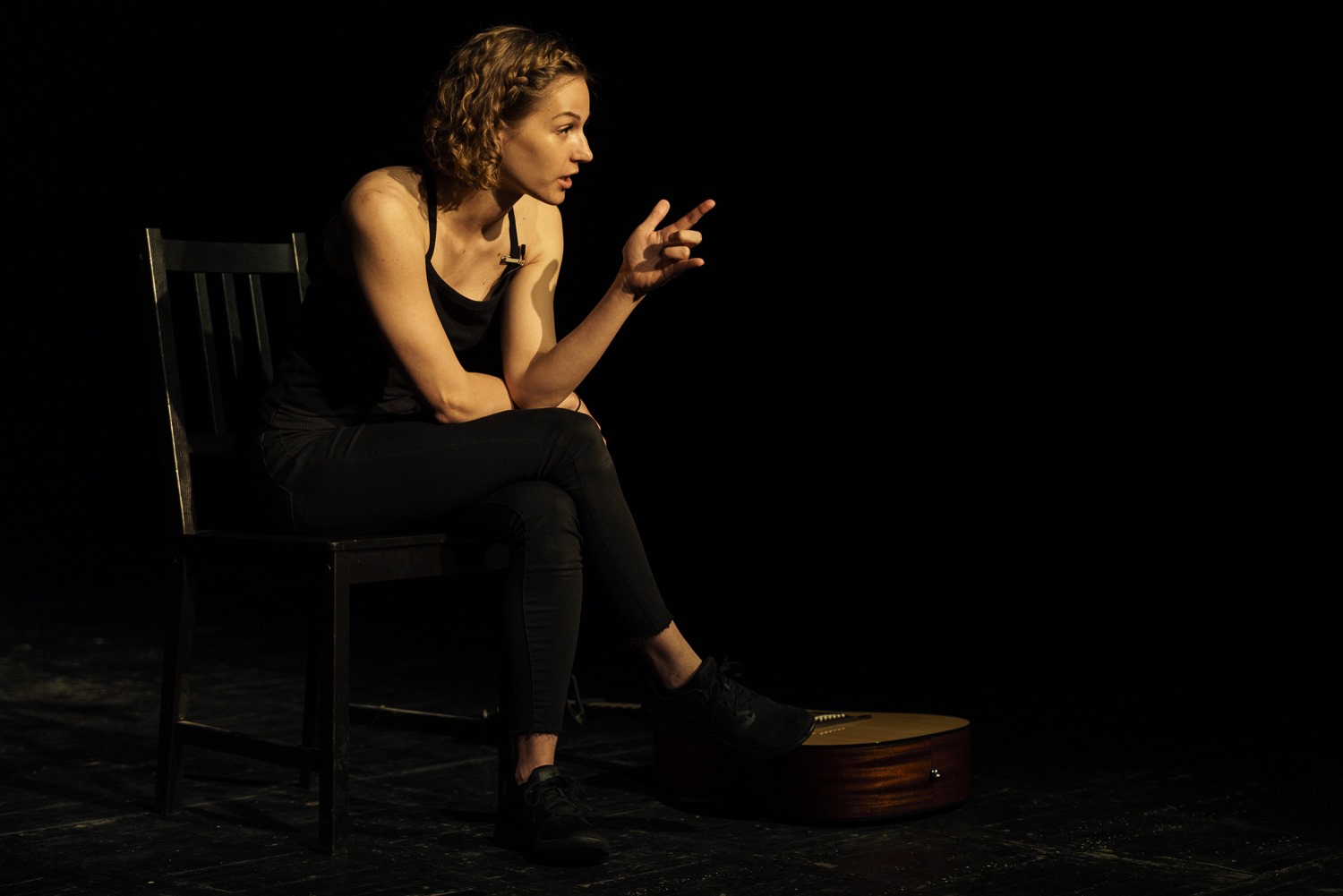
Svetlana Ulanovskaya
The review was written as a part of the project 2D Dance where foreign authors assessed video recordings of several Latvian dance performances. 2D Dance is an experiment that studies if dance is a readable form of art when put on the screen, and how local choreographers’ work can be perceived by authors who know little or nothing about Latvian dance. Reviews will be complemented by online conversations with the authors of the articles and the works’ choreographers in question. The 2D Dance project’s primary goal is to develop and underline communication differences between communities in different countries, developing the ability to talk about the art of dance, gaining an international outline, and promoting Latvian artists’ recognition.
Jana Jacuka’s mono performance “Everything’s going to be okay” is a personal portrayal of a difficult topic. How does parental love manifest? How do guardianship, care, control and power correlate in the process of one’s upbringing? Where is that fine line, after which love turns into violence and psychological trauma? Was my relationship with parents an abusive experience? These and similar questions arise while watching the performance.
“Everything’s going to be okay” is based on autobiographical material and reflects on the artist’s relationships (Jana Jacuka) with her father. The performance lacks stage design and other theatrical details. In front of the audience is a black stage space, a black chair, a performer in black casual clothes. Jana is carrying an acoustic guitar, on which she soon starts to play a lyrical tune. The guitar is not just a source of the sound. Because of it, from the first minutes of the performance, a personal, trusting connection emerges between the artist and the audience. When does a person normally pick up a guitar? As a rule, when amongst people we usually love to spend time with. The artist’s guitar play seems attentive. However, it appears that instead of focusing on the music itself, she is expressing her emotions and experiences through it. Finally, she looks up at the audience and begins her story…
From Jana Jacuka’s monologue, we learn that her father played the guitar. In a quiet, whispering voice, she speaks about her childhood and growing up. She talks about silly prejudices and prohibitions, such as the prohibition to shower on Mondays or go to church while menstruating. She explains her adolescent fear of becoming a woman, her father’s cruelty, and her unwillingness to communicate with him. Jana also mentions how, while growing up, she began to rebel against her father’s parental discipline (has an affair with a married man, etc.). Surprisingly, the performer presents such a painful and deeply personal theme in a restrained emotional key – no plastic hysterics, pathos, whipping up dramatic expression, no acting, and no theatrical effects.
“Everything’s going to be okay” is a performance in which there is nothing to see from the traditional point of view. Basically, it is nonspectacular work. Effective dynamics in it aren’t applied to the easily seen framework. Instead, dramaturgy targets viewers on a deeper level, creating invisible connection and honest, intimate communication with the audience. This anti spectacularity, in my opinion, is one of the main qualities of the work. Instead of a character, we discover an individual whose life circumstances not only relate to many others, but also encourage spectators to reflect on their own experiences. In the ending scene, when the empty chair remains on the stage, it almost seems like someone from the audience will take the seat and tell their own story.
“Everything’s going to be okay” can be viewed from various perspectives. It is an autobiographical work and, at the same time, a political statement. Through personal experience, Jana Jacuka criticizes patriarchy’s establishment of Father and Power, which is enforced on society through upbringing. Many such stories remain untold by their victims. Therefore, “Everything’s going to be okay” is a clear political gesture that pulls a sensitive topic into the light and returns voice to the silenced.
Svetlana Ulanovskaya (St. Petersburg-Minsk) – dance and ballet critic, researcher of contemporary dance, curator, lecturer, chairman of the expert council of the International Festival of Contemporary Choreography in Vitebsk (2019), expert of the Focus Russia program of the International Festival of Contemporary Dance “Open Look” (2020), editor of the almanac International Festival of Contemporary Dance “Open Look” (2020 / № 1: Focus Russia). Svetlana holds a Master of Arts degree, specializing in contemporary dance. She worked as a lecturer at the Belarusian State University of Culture and Arts (2008–2017) and the Belarusian State Academy of Music (2008–2019). She is a visiting professor at the European College of Liberal Arts in Belarus.
Svetlana Ulanovskaya (St. Petersburg-Minsk) – dance and ballet critic, researcher of contemporary dance, curator, lecturer, chairman of the expert council of the International Festival of Contemporary Choreography in Vitebsk (2019), expert of the Focus Russia program of the International Festival of Contemporary Dance “Open Look” (2020), editor of the almanac International Festival of Contemporary Dance “Open Look” (2020 / № 1: Focus Russia). Svetlana holds a Master of Arts degree, specializing in contemporary dance. She worked as a lecturer at the Belarusian State University of Culture and Arts (2008–2017) and the Belarusian State Academy of Music (2008–2019). She is a visiting professor at the European College of Liberal Arts in Belarus.
Image: “Everything’s going to be okay”, photo Andrejs Strokins